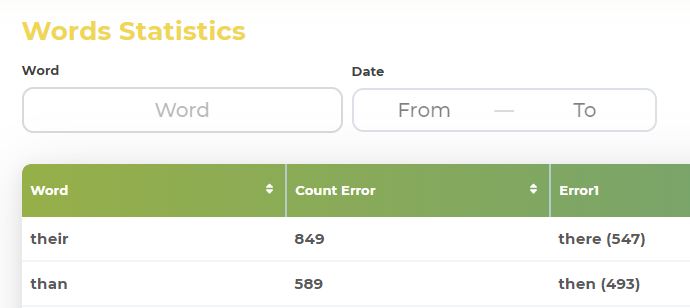Get Started With Hard Spelling Words! [Updated With Actual Records From The SpellQuiz Database]
Whenever we are talking about spelling, our brains automatically think of two things â“ words that are easy to spell and the hard spelling words. Some English words are naturally harder to spell compared to the easier counterpart.
I am talking to you, Worcestershire! Sometimes you are very hard to spell!
There is a strong tie between the hard spelling words and frequently misspelled words. Whenever we have to spell or write a hard spelling word, our brains start to play trick with us.
Sometimes, we even misspell a known word. For example, think of the word misspell. Some of us clearly know that it has double Sâ™es. But sometimes we just spell it as mispell.
Today, we will look into the deep of the hard spelling words, what makes them hard, and how you can master the hard spelling words of the English language.
Finally, we will share our records from SpellQuiz spelling section to show you the frequently misspelled words according to our users.
So, letâ™s get started!
Table of Contents
What's the hardest word to spell in English?
What's the hardest word to pronounce in English?
What makes certain words harder to spell than others?
Common problems people have when spelling
How spelling and speaking work together - the importance of pronunciation
Hard word spelling strategies for children
Hard spelling words strategies for adults
The list of frequently misspelled hard spelling words
Frequently Misspelled Words (According to SpellQuiz User Data)
Do you know how to spell hard words?
Do you notice how your brain has to concentrate on some words more than others to get the spelling right?
We are constantly spelling, even when we don't realize it. From typing a text message to writing a reminder or jotting a note down on a piece of paper. Yet, these actions are using a range of brain processes we learn when we're young.
Â
Learning to spell words is one of the fundamental building blocks in early childhood development that is continually used and built upon when we learn new words.
For many people, it comes naturally and the word structure makes basic sense. For others, it seems like a total jumble of letters just plopped together on a piece of paper.
Despite the prevalence of auto-correct on your phone or computer, the bottom line is that you need to know how to spell.

Do you want to learn to spell better?
Join us on this spelling journey, gain some useful tips and insight into the spelling process!
Start from easy to spell words for grade 1, move to difficult spelling bee words for grade 6 or take hard spelling test for adults!
You should also check out the sight words that occur frequently in English writing.Â
What Are the Hardest Spelling Words Ever in English?
Truth be told, the English language is complicated.
There are sneaky silent sounds and devious double letters that make spelling a challenge.
Despite all the rules of how to spell, there are countless exceptions too.
Do you ever feel like there are more exceptions to the rule?
You're not alone!
One common rule we learn as youngsters is the i before e, except after c.
Sure, that makes things easier, right?
Well, how about the word weird or neighbor?
Where is the letter c in those words to allow the e to come before the i?
But wait â“ there's moreâ¦
In fact, there are 923 words that break this rule, and only 44 that follow it!
Now, what about the hardest word to spell in English?
Some regular words that have people pulling their hair over the word order include:
- Accommodate thanks to the double pairing of letters
- Rhythm with its weird amount sounds and total lack of vowels
- Colonel since it sounds nothing like how it is written
As for the absolute hardest, there isn't a firm consensus out there on. It turns out that the English language is teeming with too many hard words to choose just one!
What's the Hardest Word to Pronounce in English?
Spelling and pronunciation of words go hand in hand.
Remember, how we mentioned all those cortexes in the brain, working together to recall how a word sounds and what alphabetic letters associate with those sounds?
Since English isn't a phonetic language, it makes spelling even harder.
Stop for a moment and inspect the word phonetic right there. It sounds like fon-et-ic, but there's a clumsy ph combination of letters at the beginning. It is no wonder we get so confused with spelling English words!

So, what words are the ones that create the biggest tongue-twisters and have us stumbling over sounds? There are plenty of them out there, from rural with its double 'r' sound to sixth with a fuzzy tongue feel.
But wait â“ there's moreâ¦
The one that English speakers struggle with the most has got to be... Worcestershire.
What is even going on with those letters? What sounds are they meant to make?
It is a good thing that sauce named after it tastes delicious so we can forgive the awkward mess of sounds, phonics, and letters in the actual word!
What Makes Certain Words Harder to Spell than Others?
I don't blame if you if you've sat back and sighed in frustration, wondering why this word makes no sense to spell or why that word is so difficult.
Like so many learning the English language, both native speakers and those learning it as a second language, have encountered the bizarre and confusing spelling system.
So, just why are some words easy and some words hard in English? We all define what 'easy' and 'hard' are on individual levels, but let's face it - the word handkerchief is just plain difficult to spell!
Earlier on, I touched on how the English language isn't entirely phonetic. This means that at different times, some letters don't make the sound we expect them to.
Other times, the words are phonetic, such as book. That one has straightforward sounds.
Now, onto those non-phonetic demons!
Let me guess, when you read a work like said, what comes to mind?
It is the past tense of said, so shouldn't it be spelled sayed?
That would follow the rule of play â’ played.
But, no, not in this case!
Ok, so if it is spelled said for whatever reason, why doesn't it rhyme with paid?
That's the English language for you - not always phonetic!
Let's not even get started on words like ocean or sure that have no 'sh' letters but make that sound.
You get the idea!
Interestingly, the most phonetic languages (and arguably the easiest to learn) include Spanish and Swahili. Add those to your list of languages to get on board with!
Aside from phonetics, or the lack of, there are other things that make English words hard to spell. Here are some classic examples:
-
Letter combinations such as CH, IE, and EI make words like achieve, receive, perceive confusing to spell (as well as the 'i before e' rule often not existing!).
-
The long string of vowels that appear in words like acquaintance or beautiful. Vowels change the way a word sounds so they are hard to remember when spelling.
-
Double consonants messing up the sound of things, like when they appear in accommodate, committee, or occasional. Was that one s or fifty of them?
-
Words that sound the same, but mean something different. Homonyms are an English-language worst nightmare. Is it weather or whether? Than or then? There or they're or their?!
- Some words are just hard. Take psychology or sincerely or separate for example. Are they even following a rule at all?
Why is Spelling Important?
As we mentioned earlier, spelling is something we subconsciously do each day.
There are many words we don't have to think about when we spell them. These are core spelling words that form the foundation of our vocabulary.
So, reflect on the first words you learned as a child.
Amongst the standout ones are words like "the", "at", "and".
These basic words are called high frequency sight words because they are used in our everyday vocabulary. Try this vocabulary tester to understand your current skill level!

Thankfully, they are amongst the easiest to remember!
Although many children and adults despise spelling for its repetitive and boring nature, it is highly important.
As if this isn't enough, the English language comprises a bunch of complex spelling rules, where there are often more exceptions.
No wonder so many of us get frustrated with spelling!
However, spelling makes a bigger difference than we realize to other elements of learning.
From speaking to reading and writing, spelling plays a fundamental role.
Have you ever tried expressing an opinion but not being able to make yourself clear because you can't think of the best word? We've all been there.
Someone who struggles with spelling finds it harder to articulate themselves as well in written or verbal communication, purely because their vocabulary is limited.
Developing Vocabulary: Understanding the Science Behind it
Why developing vocabulary is important?
With stronger and more confident spelling skills, there are so many more words to discover.
-
For children, developing vocabulary is important to understand new concepts and develop coherent learning skills in all subjects areas.
- For teenagers, spelling becomes more important as they as expected to move onto oral and written exams at high school.
- College students are expected to spell well to write cohesive essays.
- For adults, spelling is important because the way we read, write, or talk is crucial to success in society and work.
No matter what journey you're on in life, you'll never be disadvantaged by having strong spelling skills.
Spelling lays the building blocks for confidence with words, which in turns boosts confidence in conveying an opinion, articulating a point of view, and making requests in different situations.
How the Brain Learns to Spell?
The human brain is a marvelous creation.
Have you ever wondered how that bunch of grey matter can know so many processes?
The brain is in charge of everything we do, from thinking to feeling and remembering endless information.
Amongst these processes is being able to spell words.
Let's get down to business and take a look at how the wires in our brains put together a jumble of letters and understand them as words.
First up, the brain is divided into sections.
Each section manages a different action or process.
There is a certain part of the brain that is dedicated to constructing words.
This area retrieves information about letters and sounds over time and stores them in its long term memory.
It is a complex circuit of neurons in the left hemisphere of the brain.
Understanding the Activities of the Brain
With spelling, this is a process that the brain learns by reading and hearing words. The steps that happen are something like this:
- Brain hears the word
- Long term memory gathers information on alphabetic sounds and known phonics
- Brain matches sounds to letters
- Fine motor skills command the hand to write or type the letters to spell the word
Do you find it frustrating when you hear a word and expect it to be spelled a certain way, but then it turns out the spelling is different to how it sounds?
This is common with the English language.
Basically, the written language is a recent invention.
Human brains aren't instinctively wired to read.
Rather, ancient cultures were all about oral communication.
Therefore, when we listen to the sound of a word, we remember that first.

The way it is written with letters is secondary.
However, since we are introduced to the alphabet from such a young age, we associate sounds with letters.
So, when we hear a word, there are visual cortexes in the left hemisphere of the brain that activate.
These cortexes picture the word and what the sounds 'look' life, giving us an idea of how to spell the word.
Talk about a lot of effort for one simple word!
Common Problems People Have with Hard Spelling Words
First things first, don't feel bad if you're not a 'good' speller.
Some people are better at numbers than letters, and that is fine.
Some kids thrive on those rote-learned spelling tests and some struggle to get two words correct. No worries.
Spelling can be 'easy' or 'hard, depending on how your brain is wired.
Since the ability to spell, pronounce and remember words is mostly active in the left hemisphere, it means people with a right-dominated brain are better at other stuff, like numbers and angles.
Also, if you're a non-native speaker learning English and baffled by the combinations of letters, definitely don't feel bad!
Some native English speakers struggle to master their own language so you're doing well.
Since English comprises so many awkward words, there are many common spelling problems you might encounter.
Let's look at those tricky devils hiding amongst the English vocabulary.
Ough words
This odd vowel and consonant combination can product difference sounds in words.
This combination makes words long to spell but short to say.
It appears in words such as:
- Bought (say: bawt)
- Through (say: throo)
- Thought (say: thort)
- Tough (say: tuff)
Homonyms
We mentioned some of these before, but you can never get enough of these words that sound the same but are spelled differently and mean something different.
Think about:
- To, too, two
- Through, threw
- New, knew
- Horse, hoarse
Swallowed syllables
Here we have parts of words are there in the spelling, but not pronounced in speaking.
For instance:
- Different - "diffrent"
- Temperature - "temprature"
- Comfortable - "comftable"
Silent letters
Why, oh, why did some words get created with a letter that makes no sound?
These are classic words that make no sense in spelling (pay attention to the bolded letter that isn't sounded):
- Thumb
- Sign
- Daughter
- Knee
- Should
- Island
- Guess
Sounded letter combinations
As if the "ough" sound isn't enough, there are other letter combinations that when put together make an unexpected noise.
They can be found in words like:
- Cough = F sound
- Character = K sound
- Beak = EE sound
- Break = EI sound
- Country = UH sound
How Spelling and Speaking Work Together - the Importance of Pronunciation?
Before we spell a word, we hear it being said or we say it ourselves.
When we read a word, we either sound it out aloud or we say it silently in our minds.

Therefore, spelling and speaking go hand in hand and how a word is pronounced dictates how we spell it.Â
As we know by now, this is where English gets confusing with its lack of phonetic rules and odd letter combinations working together to tie up the tongue.
Then there are double syllables and silent letters hiding in 60 percent of words.
Nonetheless, pronouncing words is fundamental to spelling them.
Here is an example of how the way we pronounce words tricks us when we spell them.
Read this sentence below.
Jack will probly go to the libry on Wensday to get a diffrent book.
Reading it, this sentence is full of efforts. Saying it aloud, it sounds correct.
Pronunciation Might Come in Handy!
With so many silent letters and unaccented syllables, I don't blame you for wondering how you can pronounce a word to help with spelling it.
However, the strategy of 'pronouncing for spelling' is highly important.
The idea behind this is to exaggerate the pronunciation of each word.
For instance, when spelling library, the word needs to be broken down into each sound that it makes on paper (li - brar - y).
Even though we don't actively pronounce some of the sounds in there, it is an important spelling strategy.
The other thing to do when spelling is to be aware of the sound each letter makes.
This starts by knowing the individual sound the letter makes and being aware of the way vowels change the letters.
Much of spelling comes down to an educated guess.
Educating yourself on common letter combination sounds, silent letters, homonyms, phonological word structure, and all that other fun linguistic stuff is part of the spelling journey.
Mastering Hard Spelling Words: Strategies for Children
In primary education, spelling is something that kids love to hate.
When a teacher says it is time for spelling, it isn't surprising to hear a collective groan of despair in the classroom.
Since spelling isn't going anywhere, why not make it easier with some useful strategies.
Here are some ideas on how to help children learn to spell at different stages of their early education.
-
Strengthen visual memory and learn when words 'look' right
-
Play with compound words, such as sticking two words together to make a new one (shoe + lace = shoelace)
-
Be aware of root words and use prefixes and suffixes to create new words (un + happy = unhappy or brave + ly = bravely)
-
Follow reliable rules such as making regular verb past tense by adding ed (jump â’ jumped)
-
Count the syllables and sounds of a word
- Give the word a meaning to help remember what it looks and sounds like in a sentence or context
Mastering Hard to Spell Words: Strategies for Adults
For adults learning English as their second language or for those who have always had a hard time spelling, now is the time to make things easier for yourself. Spelling doesn't have to be an ongoing nightmare. Rather, it is something anyone can conquer. Adults could also try out English vocabulary dictation.Â

With some of these spelling strategy ideas, it can become easier to get the letter order right.
- Make a flowchart or graph of the rules and the exceptions
- Study and memorize sight words by accessing a Dolch list (these include common nouns, adverbs, verbs, adjectives, prepositions)
- Look for patterns when reading books or newspapers
- When it doubt, spell out loud
- Try a touch-typing or spelling course
And you can always try hard spelling test for adults on SpellQuiz!
Conclusion
After a look at the confusing spelling words, rules, and letter sounds, I think we can all agree that English is a complicated language.
For native speakers and those learning English as a second language, spelling is something that trips us all up at some point.
While spelling might not be everyone's cup of tea, it is important to know how to spell tea as opposed to tee.
Don't let English confuse you any longer.
Rather, take control of your ability to spell by improving understanding of words, phonics, and vowel or consonant combinations.
There are many spelling strategies available to help people of all ages take their spelling skills from zero to hero.
Get a head start today and put those difficult words in the right place with SpellQuiz!Â
Now you can take part in online Spelling Bee too! Check out the SBO section on Spellquiz today!
Below is the 20 Frequently Misspelled Hard Spelling Words List
| Misspelled Words | Correct spelling |
| Carribean | Caribbean |
| Wendsday | Wednesday |
| acceptible | acceptable |
| writeable | writable |
| wisper | whisper |
| untill | until |
| twelth | twelfth |
| vinigar | vinegar |
| supress | suppress |
| racoon | raccoon |
| truely | truly |
| releaf | relief |
| procede | proceed |
| occurence | occurrence |
| spageti | spaghetti |
| tommorow | tomorrow |
| noticable | noticeable |
| missle | missile |
| threshhold | threshold |
| pedistal | pedestal |
Â
Frequently Misspelled Words (According to SpellQuiz User Data)
Â

|
Correct Word |
Correctness Percentage |
Top Misspelled Words |
Misspelling Percentage |
Total Misspelling Percentage |
|
Appearance |
66.77% |
Apperance |
15.99% |
33.23% |
|
Appearence |
10.66% |
|||
|
Apearance |
3.45% |
|||
|
Apperence |
3.13% |
|||
|
Government |
67.15% |
Goverment |
29.35% |
32.85% |
|
Gonvernment |
1.71% |
|||
|
Acquired |
63.28% |
Aquired |
30.08% |
36.72% |
|
Acuired |
2.73% |
|||
|
Aquaired |
1.95% |
|||
|
Accquired |
1.95% |
|||
|
Accidentally |
66.22% |
Accidently |
18.02% |
33.78% |
|
Accidentaly |
8.11% |
|||
|
Accedentally |
4.50% |
|||
|
Accedentaly |
3.15% |
|||
|
Autumn |
68.78% |
Autum |
20.98% |
31.22% |
|
Autom |
2.93% |
|||
|
Autumn |
3.90% |
|||
|
Autmn |
3.41% |
|||
|
Abundant |
68.04% |
Abundent |
18.56% |
31.96% |
|
Abandoned |
6.19% |
|||
|
Abondent |
3.61% |
|||
|
Abondint |
3.61% |
|||
|
Patience |
81.63% |
Patients |
9.52% |
18.37% |
|
Patient |
3.40% |
|||
|
Pations |
3.40% |
|||
|
Pacience |
2.04% |
|||
|
Different |
59.69% |
Diffrent |
29.59% |
40.31% |
|
Diferent |
4.08% |
|||
|
Difrent |
3.57% |
|||
|
Defferent |
3.06% |
|||
|
Arithmetic |
73.72% |
Arithmatic |
16.95% |
26.28% |
|
Arithmetic |
3.39% |
|||
|
Arythmetic |
2.82% |
|||
|
Environment |
65.14% |
Enviroment |
16.00% |
34.86% |
|
Enviorment |
13.71% |
|||
|
Inviorment |
3.43% |
|||
|
Envierment |
1.71% |
|||
|
Always |
64.74% |
Allways |
16.76% |
35.26% |
|
Alway |
11.56% |
|||
|
All |
4.05% |
|||
|
Alwas |
2.89% |
|||
|
Through |
68.13% |
Threw |
10.00% |
31.88% |
|
Though |
8.13% |
|||
|
Throw |
7.50% |
|||
|
Thru |
6.25% |
|||
|
Competition |
74.65% |
Compitition |
7.75% |
25.35% |
|
Compation |
6.34% |
|||
|
Competetion |
6.34% |
|||
|
Competion |
4.93% |
|||
|
Which |
55.85% |
Wich |
30.85% |
44.15% |
|
Witch |
9.04% |
|||
|
With |
2.13% |
|||
|
Which |
2.13% |
|||
|
Could |
69.08% |
Can |
15.13% |
30.92% |
|
Cud |
5.92% |
|||
|
Cood |
5.26% |
|||
|
Coud |
4.61% |
|||
|
Receive |
56.59% |
Receive |
26.37% |
43.41% |
|
Recive |
9.34% |
|||
|
Received |
3.85% |
|||
|
Reseve |
3.85% |
|||
|
Important |
67.11% |
Important |
13.82% |
32.89% |
|
Inportant |
9.21% |
|||
|
Inportint |
5.26% |
|||
|
Inportent |
4.61% |
|||
|
Hurt |
64.74% |
Hert |
21.79% |
35.26% |
|
Hurts |
5.13% |
|||
|
Hart |
5.13% |
|||
|
Herd |
3.21% |
|||
|
Beautiful |
71.74% |
Beatiful |
10.87% |
28.26% |
|
Butiful |
7.97% |
|||
|
Beautiful |
5.80% |
|||
|
Beautifull |
3.62% |
|||
|
Choir |
66.00% |
Quire |
23.33% |
34.00% |
|
Quier |
4.67% |
|||
|
Chior |
3.33% |
|||
|
Quir |
2.67% |
|||
|
Stopped |
56.73% |
Stoped |
24.71% |
43.27% |
|
Stop |
14.37% |
|||
|
Stopt |
3.45% |
|||
|
Religious |
64.67% |
Religous |
29.33% |
35.33% |
|
Religios |
2.00% |
|||
|
Religeous |
2.00% |
|||
|
Relegious |
2.00% |
|||
|
Ancestor |
64.43% |
Ansester |
18.12% |
35.57% |
|
Ancester |
11.41% |
|||
|
Ansestor |
3.36% |
|||
|
Ansister |
2.68% |
|||
|
Accept |
59.63% |
Except |
25.47% |
40.37% |
|
Exept |
6.83% |
|||
|
Acept |
5.59% |
|||
|
Eccept |
2.48% |
|||
|
Received |
54.91% |
Recieved |
28.90% |
45.09% |
|
Recived |
12.14% |
|||
|
Receive |
2.31% |
|||
|
Resived |
1.73% |
|||
|
Calendar |
52.81% |
Calender |
34.27% |
47.19% |
|
Calander |
8.43% |
|||
|
Calenders |
2.81% |
|||
|
Callender |
1.69% |
|||
|
Friends |
69.40% |
Friend |
12.41% |
30.60% |
|
Frends |
8.76% |
|||
|
Freinds |
8.76% |
|||
|
Because |
65.71% |
Becuase |
13.57% |
34.29% |
|
Becouse |
12.86% |
|||
|
Becus |
4.29% |
|||
|
Becase |
3.57% |
|||
|
Tomorrow |
60.67% |
Tommorow |
24.67% |
39.33% |
|
Tomorow |
6.67% |
|||
|
House |
4.00% |
|||
|
Tommorrow |
4.00% |
|||
|
Business |
59.18% |
Buisness |
25.85% |
40.82% |
|
Bussiness |
7.48% |
|||
|
Bussines |
4.76% |
|||
|
Buissnes |
2.72% |
|||
|
Would |
58.90% |
Will |
24.66% |
41.10% |
|
What |
9.59% |
|||
|
Wood |
4.11% |
|||
|
Would |
2.74% |
|||
|
Behavior |
58.22% |
Behaviour |
31.51% |
41.78% |
|
Behaver |
4.79% |
|||
|
Behavour |
3.42% |
|||
|
Behaveor |
2.05% |
|||
|
Water |
75.22% |
Watter |
8.85% |
24.78% |
|
Water |
6.19% |
|||
|
Woter |
5.31% |
|||
|
Wather |
4.42% |
|||
|
Lead |
52.15% |
Led |
43.56% |
47.85% |
|
Need |
1.84% |
|||
|
Lid |
1.23% |
|||
|
Lad |
1.23% |
|||
|
Caught |
60.71% |
Cut |
17.86% |
39.29% |
|
Cought |
14.29% |
|||
|
Cuaght |
3.57% |
|||
|
Cot |
3.57% |
|||
|
People |
72.81% |
Peaple |
9.65% |
27.19% |
|
Pepole |
7.89% |
|||
|
People |
6.14% |
|||
|
Peope |
3.51% |
|||
|
Beliefs |
65.60% |
Believes |
15.20% |
34.40% |
|
Belifes |
7.20% |
|||
|
Beleifs |
7.20% |
|||
|
Belives |
4.80% |
|||
|
Sharks |
74.31% |
Shark |
16.51% |
25.69% |
|
Sherks |
3.67% |
|||
|
Shorks |
2.75% |
|||
|
Sharcks |
2.75% |
|||
|
Does |
61.83% |
Dose |
26.72% |
38.17% |
|
Dus |
5.34% |
|||
|
Doesn't |
3.05% |
|||
|
Das |
3.05% |
|||
|
Very |
63.49% |
Vary |
15.08% |
36.51% |
|
Verey |
10.32% |
|||
|
Every |
6.35% |
|||
|
Really |
4.76% |
|||
|
Called |
60.77% |
Call |
24.62% |
39.23% |
|
Cold |
6.15% |
|||
|
Calld |
5.38% |
|||
|
Could |
3.08% |
|||
|
Pageant |
58.96% |
Pagent |
34.33% |
41.04% |
|
Padgent |
2.99% |
|||
|
Peagent |
2.24% |
|||
|
Pagaent |
1.49% |
|||
|
Spilled |
61.29% |
Spilt |
22.58% |
38.71% |
|
Spiled |
7.26% |
|||
|
Spild |
4.84% |
|||
|
Spelled |
4.03% |
|||
|
Audience |
68.47% |
Audiance |
22.52% |
31.53% |
|
Auidence |
3.60% |
|||
|
Adience |
2.70% |
|||
|
Audence |
2.70% |
|||
|
Appreciate |
77.32% |
Appriciate |
11.34% |
22.68% |
|
Apreciate |
5.15% |
|||
|
Aprociate |
3.09% |
|||
|
Appericate |
3.09% |
|||
|
Want |
62.50% |
Wont |
16.67% |
37.50% |
|
What |
13.33% |
|||
|
Wan |
4.17% |
|||
|
Wan't |
3.33% |
|||
|
Ceiling |
64.91% |
Celing |
11.40% |
35.09% |
|
Celling |
10.53% |
|||
|
Sealing |
7.02% |
|||
|
Ceiling |
6.14% |
|||
|
Sturdy |
68.52% |
Sterdy |
14.81% |
31.48% |
|
Study |
7.41% |
|||
|
Sterty |
5.56% |
|||
|
Sturty |
3.70% |
|||
|
Community |
63.48% |
Comunity |
30.43% |
36.52% |
|
Commuitity |
2.61% |
|||
|
Cummunity |
1.74% |
|||
|
Communty |
1.74% |
|||
|
Cleanse |
65.18% |
Clense |
16.96% |
34.82% |
|
Cleansed |
6.25% |
|||
|
Cleans |
6.25% |
|||
|
Clens |
5.36% |
|||
|
Aesthetic |
67.59% |
Asthetic |
13.89% |
32.41% |
|
Esthetic |
7.41% |
|||
|
Astetic |
5.56% |
|||
|
Static |
5.56% |
|||
|
Beautifully |
65.74% |
Beautifuly |
13.89% |
34.26% |
|
Beutifully |
10.19% |
|||
|
Beatifully |
5.56% |
|||
|
Beautifly |
4.63% |
|||
|
Absolute |
81.18% |
Absolut |
5.88% |
18.82% |
|
Absulut |
4.71% |
|||
|
Absoulute |
4.71% |
|||
|
Apsolute |
3.53% |
|||
|
Processing |
60.18% |
Prossesing |
16.81% |
39.82% |
|
Prosessing |
10.62% |
|||
|
Proccessing |
7.08% |
|||
|
Prosesing |
5.31% |
share now:
Spelling Tests per Grade


